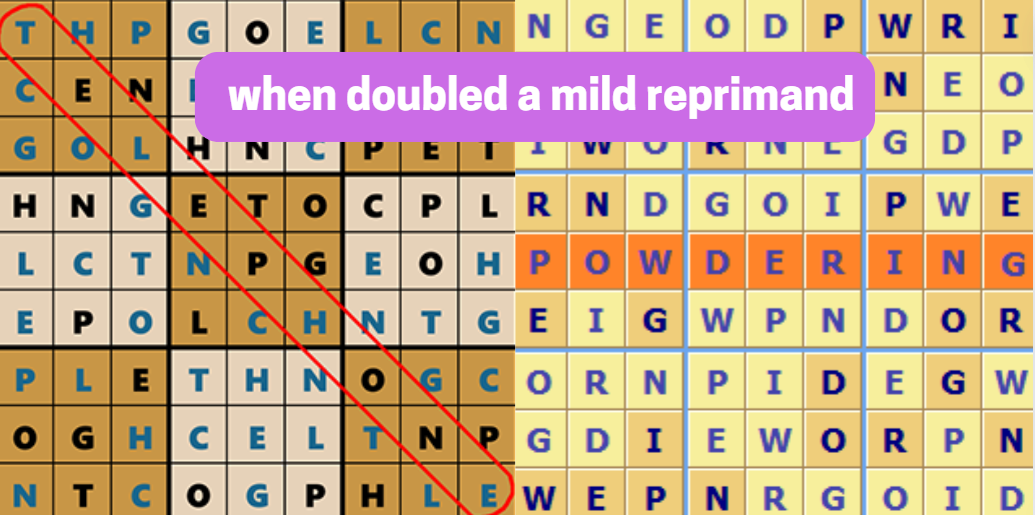When Doubled, a Mild Reprimand: Unveiling the Mystery Behind the Phrase
In the realm of crossword puzzles and word games, certain phrases and clues hold particular intrigue due to their clever wordplay and double meanings.
One such phrase is “when doubled a mild reprimand,” which has puzzled and delighted enthusiasts for years. This article aims to delve into the origins, meanings, and applications of this phrase, providing comprehensive insights and interpretations that go beyond the surface.
Contents
- 1 Understanding the Phrase: “When Doubled, a Mild Reprimand”
- 2 The Popularity of Crosswords and Word Puzzles
- 3 The Art of Clue Construction
- 4 Beyond the Puzzle: Real-Life Applications
- 5 Crossword Clues Similar to “When Doubled, a Mild Reprimand”
- 6 The Broader Implications of Wordplay
- 7 FAQs about “When Doubled, a Mild Reprimand”
- 7.1 What does “when doubled a mild reprimand” mean?
- 7.2 How do crossword clues like “when doubled a mild reprimand” enhance cognitive skills?
- 7.3 Are there other common crossword clues similar to “when doubled a mild reprimand”?
- 7.4 Why are mild reprimands important in communication?
- 7.5 Can engaging with crossword puzzles improve mental health?
- 8 Conclusion
Understanding the Phrase: “When Doubled, a Mild Reprimand”
Definition and Context
The phrase “when doubled a mild reprimand” typically appears as a clue in crossword puzzles. The answer to this clue is “tut,” a word that, when repeated (tut-tut), conveys mild disapproval or a gentle scolding. This type of wordplay is a common feature in crosswords, where clues often have layered meanings that challenge solvers to think creatively.
Linguistic Roots
The word “tut” has its origins in Middle English, where it was used as an expression of disapproval. Over time, it has evolved into a mild reprimand, often used in a light-hearted or humorous context. When doubled, the word amplifies its meaning slightly, but it remains far from a severe admonishment.
The Popularity of Crosswords and Word Puzzles
A Brief History
Crossword puzzles have been a popular form of entertainment and mental exercise since the early 20th century. The first known published crossword puzzle appeared in the New York World newspaper on December 21, 1913. Since then, crosswords have become a staple in newspapers, magazines, and digital platforms worldwide.
Cognitive Benefits
Engaging in crossword puzzles offers numerous cognitive benefits, including improved vocabulary, enhanced problem-solving skills, and increased mental agility. These puzzles challenge the brain to recognize patterns, recall information, and make connections between seemingly unrelated concepts.
The Art of Clue Construction
Types of Clues
Crossword clues can be straightforward or cryptic, requiring solvers to interpret puns, anagrams, homophones, and other forms of wordplay. The clue “when doubled a mild reprimand” is an example of a cryptic clue, where understanding the word “doubled” is key to finding the solution.
Strategies for Solving
To solve cryptic clues, it’s essential to consider the various ways words can be manipulated. For example, doubling a word, reversing it, or substituting letters are common techniques used by crossword constructors. Familiarity with these strategies can significantly improve one’s ability to solve puzzles efficiently.
Beyond the Puzzle: Real-Life Applications
Mild Reprimands in Daily Life
In everyday interactions, mild reprimands serve as gentle reminders or corrections. They are typically used in situations where a severe admonishment is unnecessary. For instance, a parent might use a mild reprimand to remind a child to tidy their room or complete their homework.
Cultural Variations
Different cultures have various ways of expressing mild reprimands. In English-speaking countries, phrases like “tut-tut” or “now, now” are common. In other cultures, similar expressions might be used with varying degrees of formality and tone. Understanding these nuances can enhance cross-cultural communication and foster better relationships.
Crossword Clues Similar to “When Doubled, a Mild Reprimand”
Hawaiian Dance: Hula
Another interesting clue often seen in crosswords is “Hawaiian dance.” The answer to this clue is “hula,” a traditional Hawaiian dance characterized by rhythmic movements and storytelling through gestures. The hula has significant cultural importance in Hawaii and is often performed at celebrations and ceremonies.
Very Friendly: Buddy
The clue “when doubled, very friendly” leads to the answer “buddy.” When repeated (buddy-buddy), it implies a close or overly familiar relationship. This term is often used to describe two people who share a strong bond or friendship.
The Broader Implications of Wordplay
Enhancing Language Skills
Engaging with wordplay and puzzles can enhance language skills by expanding vocabulary and improving comprehension. Solvers are exposed to new words and phrases, which they can incorporate into their everyday language use.
Creative Thinking
Solving puzzles encourages creative thinking by challenging individuals to approach problems from different angles. This skill is valuable not only in recreational activities but also in professional and academic settings, where innovative solutions are often required.
FAQs about “When Doubled, a Mild Reprimand”
What does “when doubled a mild reprimand” mean?
The phrase refers to a word that, when repeated, signifies a mild reprimand. The answer to this crossword clue is “tut,” which becomes “tut-tut” when doubled.
How do crossword clues like “when doubled a mild reprimand” enhance cognitive skills?
Crossword clues like this one enhance cognitive skills by requiring solvers to recognize patterns, think creatively, and make connections between words and meanings. This process stimulates brain activity and improves problem-solving abilities.
Are there other common crossword clues similar to “when doubled a mild reprimand”?
Yes, other common clues include “Hawaiian dance” (answer: hula) and “when doubled, very friendly” (answer: buddy). These clues also rely on wordplay and require solvers to think beyond the literal meanings of words.
Why are mild reprimands important in communication?
Mild reprimands are important because they allow individuals to correct behavior or provide feedback without causing offense or creating conflict. They are often used in situations where a gentle reminder is sufficient to address the issue.
Can engaging with crossword puzzles improve mental health?
Yes, engaging with crossword puzzles can improve mental health by reducing stress, providing a sense of accomplishment, and keeping the mind active. Regularly solving puzzles has been linked to improved cognitive function and a lower risk of cognitive decline.
Conclusion
The phrase “when doubled a mild reprimand” exemplifies the clever wordplay and layered meanings that make crossword puzzles so engaging. By exploring the linguistic roots, cultural implications, and cognitive benefits of this and similar clues, we gain a deeper appreciation for the art of puzzling.
Whether you’re a seasoned solver or a curious beginner, delving into the world of crosswords can enhance your language skills, stimulate creative thinking, and provide endless entertainment.
As you continue to encounter and solve clues like “when doubled a mild reprimand,” remember that each puzzle is an opportunity to expand your knowledge and challenge your mind. Happy puzzling!

